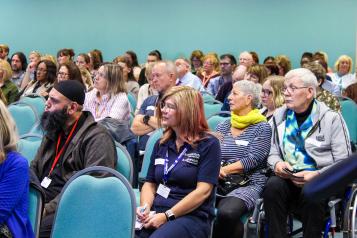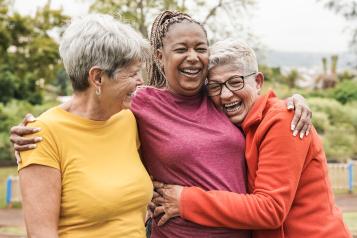Your views help make changes across the country
At our On Equal Terms Conference and AGM this week, Imelda Redmond, National Director of Healthwatch England, thanked local people for sharing their experiences and giving their feedback.
She also praised the work of our Healthwatch in involving people in building better services.
“You are great partners to work with and one of the best in England in how you respond. You are exemplary in making sure the views of local people make a difference.”
Commitment to local communities
She said nationally more needed to be done to work with communities who go unheard, are often overlooked and ignored.
“To tackle unfair health differences, those in power need to really listen to hear the experiences of people facing inequalities and understand the steps of how to improve people’s lives.”
And she said a big piece of work for Healthwatch England was to explore the barriers to people being heard – and how to dismantle them.
“We need to understand and amplify the voices of those who were not heard by the NHS, local councils and national government.”
Facing facts …
Imelda said that the pandemic has shone a light on long standing health inequalities and strengthened the conviction that society must address the worst outcomes.
“The past year has bought stark relief that health and wellbeing are not equal,” she said.
- People have faced real difficulties just because of where they lived, their income or their race.
- If you lived in a deprived area, you were twice as likely to die from Covid.
- Before the pandemic, men in the least deprived areas could at birth expect to live 9.4 years longer than those in most deprived areas.
- For women, the gap is 7.5 years.
- People in the least deprived areas can expect at least 19 more years in good health than those in most deprived areas.
- When it comes to mental health, detention rates under the Mental Health Act are more than four times higher among black or black British than white groups.
- The more deprived areas tend to have fewer GPs per head and lower rates of admission to elective care - despite having a higher burden of disease.
What we're doing about health inequalities
This year, there will be a big Healthwatch England campaign to capture more experiences from minority ethnic backgrounds.
Information about the people who feedback to us is also being improved. This is important because it shows who’s being left behind and the impact of certain policies on different communities.
Work is also planned to make sure Healthwatch staff, directors and volunteers are representative of the communities they serve.
Here in Cambridgeshire, our Healthwatch will be working hard to put equality, diversity and inclusion at the centre of our work too.
In our annual report, our CEO Sandie Smith says: “In the coming year, we will be redoubling our efforts to listen to those people who are at most disadvantage, and working with our local services to make improvements.”
Tell us your experiences too
Giving feedback, both good and bad, helps improve our health and care services - locally and nationally.
If you use GPs and hospitals, dentists, pharmacies, care homes or other support services in Cambridgeshire, we want to hear about your experiences.
By telling us what's working well or - if there are problems - our NHS and care teams can understand what's important to you and help make care better.
Take five minutes to feedback using our online form - there's a BSL version too!


